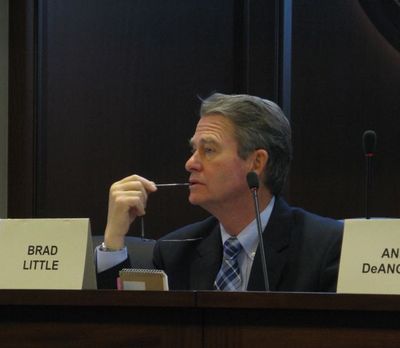Task force: Idaho needs $543M more for roads

BOISE - Idaho needs to spend $543 million a year more on its roads, Gov. Butch Otter’s transportation task force decided Tuesday, and the top ways it should raise the money are through raising gas taxes, registration fees and trucking fees and taxing car rentals.
The task force stopped short, however, of calling for any specific increases or any specific timeline for them.
“There may be a time in the future we can do it. We can’t do it now,” said task force member Jim Kempton, an Idaho public utilities commissioner and former House transportation chairman.
House Tax Chairman Dennis Lake, R-Blackfoot, cast the only vote against the task force’s final resolution, which was 18 months in the making.
“I wanted the task force to come up with specific recommendations to fund enhancements for the Department of Transportation - we didn’t do it,” Lake said after the vote. “I think that we chose a cautious way out.”
Sen. Shawn Keough, R-Sandpoint, disagreed. “We’ve identified the problem, we’ve identified the tools - that was our task,” she said. “Now that goes to the governor and the Legislature.”
As a lawmaker, Keough said, she’ll weigh the recommendation against the state’s economy, the rest of the state budget and input from people in her district.
Idaho Lt. Gov. Brad Little, who chaired the task force, said, “Frankly I’m very pleased at how things came out today. I think we’ve come up with a roadmap. I think we’ve acknowledged how difficult it’s going to be.”
In an all-day meeting Tuesday, the 14-member task force hashed out a long resolution addressing various transportation funding issues, in addition to the overall price tag and two dozen priority-ranked revenue-raising options.
Among them:
—- The task force backed permanently restoring a 3 percent share of gas tax that’s long gone to the state Department of Parks and Recreation for trails, reflecting the amount of gas that’s burned off-road in ATV’s, boats, snowmobiles and the like. An end-of-session compromise on transportation funding two years ago sought to shift that money to the Idaho Transportation Department for roads, but after an outcry from recreationists, lawmakers agreed to put the shift off until July 1, 2011; this recommendation would reverse it permanently, should the Legislature follow it.
—- The task force endorsed a larger shift back to ITD of millions a year that now help fund the Idaho State Police. Sen. Dean Cameron, R-Rupert, co-chair of a legislative committee that’s studying how to fund ISP without the gas tax money, said a dollar-per-month surcharge on car insurance is one option that would raise $19 million a year and more than cover the loss to the state police.
—- The panel forwarded a new cost-allocation study, which it earlier adopted unanimously, showing that cars and pickups overpay for their wear and tear on Idaho roads while heavy trucks underpay; it also called for phasing in any moves to correct that over several years. However, several members expressed squeamishness over including any wording in their resolution suggesting that trucks underpay; task force member Jim Riley, head of a timber industry group, said the state’s system already is balanced.
House Transportation Chair JoAn Wood, R-Rigby, said the balance was thrown off after a lawsuit filed by the American Trucking Association forced Idaho to repeal its weight-distance tax in 2000. “I think there needs to be some correction, no doubt about it,” she said. “I know we’ve got to work on it.”
—- The task force called for re-examining funding distribution formulas to local highway jurisdictions to make sure they fit the needs. Some districts have dozens of bridges, for example, while others have only a few.
—- A subcommittee’s list of possible ways to fund public transportation in the long term, including local-option taxes, was included in the resolution, though Lake said he thought that issue was best left to the House Revenue and Taxation Committee.
The two dozen prioritized revenue-raising measures start with gas taxes, including raising the tax and indexing it to inflation; then move to car rental taxes, registration fee increases for both cars and trucks, local-option vehicle registration fees and a new weight-distance tax for heavy trucks. Further down the priority list are things like an excise tax on tires, a local-option fuel tax and a tax based on miles traveled.
Sen. Chuck Winder, R-Meridian, a former Idaho Transportation Board chairman, praised the panel’s work in developing figures reflecting the full needs for transportation in Idaho, saying past focus on the $240 million shortfall just for maintenance gave people the wrong idea. When road and bridge improvements needed for safety and traffic growth are added in, the figure balloons; the task force’s numbers also reflect costs both for local highway jurisdictions and for the state.
“I think these numbers indeed reflect a more accurate picture of what the need is,” Winder said. “Now, whether it gets funded at that level is another question, but I think it accurately depicts the need.”
Each penny increase in Idaho’s 25-cent per gallon gas tax raises $8.2 million a year for roads; to raise the full $543 million, “We’d be facing a 66 cent a gallon fuel tax increase,” Lake said. “I don’t think there’s a person on the committee that thinks that’s realistic.”